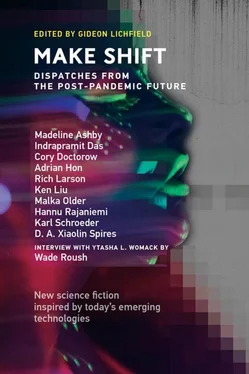I peer at the butsudan, at the picture of Ena’s smiling face next to the memorial tablet. I place an offering of satsuma and steaming rice. For good measure, I position by her photo SKIM-2’s output of a small cup of rich junmai sake. Next to that, I set down the electrolyte chaser it shook and poured.
You’re my first customer, Ena. I’ll serve this at my bar next.
I imagine her smile after practice, sweaty but vivacious at the bar counter, keeping me company as I finish work. She recounts judo moves as she puts me in a playful choke and plants a kiss on my cheek, her other hand reaching for a quenching cup of sake.
I can’t help but think that’s ikigai. Getting together with your loved ones, sharing a drink.
And for a moment, I forget about speed or execution and the utter convenience of kwik koji—it’s about being together for it all and savoring each instance once there.
I dip a finger in sake. I caress her cheek, and holding my finger there for what seems like an eternity, smearing the glass of the frame with a fingerprint of my home-brewed concoction, knowing she’d be happy for me.
I wish I could say the smile in her photo gets wider.
I smile back and get ready for tomorrow, just another day at the bar.

10
A Necessary Being
Indrapramit Das
0
Brishti had a memory that seemed unreal but wasn’t, of an army of giants carrying an entire forest on their shoulders and backs. She couldn’t remember her mother, but she remembered this. The giants had carried the forest to the city, and pounded old roads with their great fists, tearing asphalt and concrete like cloth, filling trenches with fresh soil to plant the trees they’d carried.
People watched from the valley of buildings around them, many wearing face masks. Some shook their heads or shouted as they watched their roads vanish. Others clapped and cheered as they watched the forest come to their plague-haunted city, to bear fruit and breathe for its choked denizens. Brishti couldn’t remember who had held her in that moment, listening to the tolling of their fists, warned to keep a distance by the flashing lights on their bodies.
One of those giants would become Brishti’s father.
I
It was well into the age of plagues that Brishti was born again. It was a time of warnings, of sirens blaring across the skies, alerts sparking across networks to warn people of pandemics, wildfires, superstorms, flocks and swarms that darkened the sky in panic. The streets of Kolkata were emptier than they had been for centuries, with most of its millions huddled at home or in rows of garibaris, old fossil-fueled cars reclaimed as interim homes for those who didn’t have any. Hundreds of thousands had vanished to overcrowded crematoriums, ghats, and burial grounds.
During superstorms, the roads were rivers. As one of these cyclones roared into the megacity from the Bay of Bengal, unhindered by the sunken Gangetic delta, a lone child clung to a bobbing branch in one of those rivers. She shouldn’t have survived that maelstrom, but some atavistic impulse, some holy hope, had kept her clinging to that branch, saved only by her scant malnourished weight on the shattered tree limb. As the child tumbled through the city on her branch, the wind strengthening with each passing second, she floated near a giant who stood in the waters, epaulettes of light flashing on its shoulders and bursting in starry spray across the flowing floods and rain-slashed air.
The giant saw her.
The giant swept one great arm down and snatched her off the branch, taking the child to their chest as a mere man might hold a tiny kitten found in a gutter. And the giant’s chest opened up to reveal their beating brown heart—a man, who took from the giant’s hands the child, his skin quickly shone by the rain to match the gleam of his new charge. The giant’s glass-webbed ribs shut again, to seal in their confines man and child, as well as the little girl’s first memory of the new life she was hurled into by the storm. It was, perhaps, a memory only imagined later when her father told her how it had happened—the memory of her first time inside the giant, from cold to the warm gush of the giant’s breath against her, steam fogging the panes of their transparent chest, the earthy smell of the man’s soaked limbs holding her to his chest, the softly blinking lights that lined the inside of her great savior as they stood waiting. “You’re safe, you’re safe,” the man told her over and over again, like the words of a song.
He would tell her often that he’d had named her Brishti, rain , right then and there, rain outside lashing the giant’s skin, rain inside running down their skin and turning to fog on instruments and windows. Brishti knew he hadn’t named her in that moment. It didn’t matter—it was true in the same way that he was that being of ultra-strong but lightweight metal and carbon fiber that had rescued her. In that moment she was born Brishti, daughter of a giant and a superstorm, even if neither of them knew it yet. He wiped the caul of rain from her dazed face and smiled at her for the first time.
THE GIANT SPENT THAT NIGHT WALKING THE STORM-LASHED CITY, REMOVING FALLENtrees, cables, and posts from the street, their outer body sometimes sparking when live wires shocked it, dimming the lights inside.
Brishti spent that night curled against the giant’s heart, sat in his lap, shivering despite the heat inside, which the man had turned up to dry the both of them, having no clothes to replace her tattered t-shirt and shorts. He’d wrapped a threadbare blanket and towel around her.
The giant waded Kolkata’s streets, sweeping searchlights across the waves and hurtling squalls. The giant’s heart lent the girl the heat of his blood as he piloted his greater body, his arms moving in comforting concert with the limbs outside, the wired braces around his limbs sometimes pushing against her with a comforting assurance. She had no mask. She could have been infected with any number of the novel pathogens scouring the world, her foreign body a hazard to the greater one of the giant and their heart. But the giant’s heart kept her in their shelter, let her arms unfurl slowly from a tight curl against her chest to an embrace around his torso, cold hands tucked between his back and his seat, head against his ribs. She was the rain against his chest. Inside, outside. She could hear his heart beat, even above the hum and hiss of the giant’s sinews, the roar of raindrops against their body.
THE NEXT DAY, BRISHTI WATCHED HER RESCUER HELP CLEAR THE STORM-STRUCKmegacity with other giants, all the while sitting in his lap. She learned the face of the giant’s heart by light of day—his fearsome but graying muttonchop beard, insomniac eyes bloodshot, bald pate always glistening with sweat, heralding a surprising ponytail of curly hair tied with a rubber band. His white tank top was grayed by extensive use.
They never had direct contact with other humans, only seeing giants and vehicles, or people, in the distance, at their windows, descending up or down the mountainous spires of multi-stories on tensor cables from their balconies, tending to the vertical gardens hanging off the buildings. It came back to her, this land recreated by the giants—roads turned to forested paths and groves, buildings forming verdant vales and geometric hills bejeweled with windows, the distances of emptiness given to the city by the plagues filling with vegetation. The giants had wandered Kolkata like gods, transforming the land, grasping in their titanic hands an opportunity to draw the wilderness back to cool the Earth’s raging fever.
Читать дальше













